OPEN is excited to announce a new partnership with the Northeastern library. We now have a number of e-books accessible to students and staff Scroll down to see different topic areas. View the Northeastern University Library’s full list.
Sexual Violence Virtual Library
Sexual Violence Library Resources
We now have a number of e-books accessible including survivor stories, workbooks for survivors, and books about sexual violence listed below.
Survivor Stories
Books with first-person stories written by survivors.
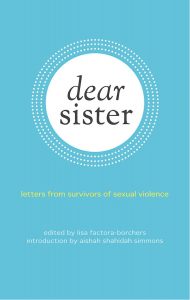 Dear Sister: Letters from Survivors of Sexual Violence edited by Lisa Factora-Borchers, introduction by Aishah Shahidah Simmons
Dear Sister: Letters from Survivors of Sexual Violence edited by Lisa Factora-Borchers, introduction by Aishah Shahidah Simmons
“Dear Sister shares the lessons, memories, and vision of over fifty artists, activists, mothers, writers, and students who share their stories of survival or what it means to be an advocate and ally to survivors. Written in an epistolary format, this multi-generational, multi-ethnic collection of letters and essays is a moving journey into the hearts and minds of the survivors of rape, incest, and other forms of sexual violence, written directly to and for other survivors.”
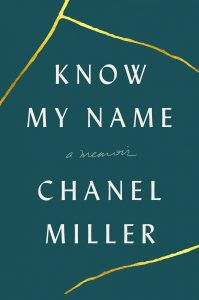 Know My Name: A Memoir by Chanel Miller
Know My Name: A Memoir by Chanel Miller
Chanel Miller “was known to the world as Emily Doe when she stunned millions with a letter. Brock Turner had been sentenced to just six months in county jail after he was found sexually assaulting her on Stanford’s campus. Her victim impact statement was posted on BuzzFeed, where it instantly went viral–viewed by eleven million people within four days, it was translated globally and read on the floor of Congress; it inspired changes in California law and the recall of the judge in the case…Now she reclaims her identity to tell her story of trauma, transcendence, and the power of words…Her story illuminates a culture biased to protect perpetrators, indicts a criminal justice system designed to fail the most vulnerable, and, ultimately, shines with the courage required to move through suffering and live a full and beautiful life.”
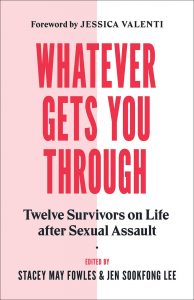 Whatever Gets You Through: Twelve Survivors on Life After Sexual Assault edited by Stacey May Fowles and Jen Soofkong Lee
Whatever Gets You Through: Twelve Survivors on Life After Sexual Assault edited by Stacey May Fowles and Jen Soofkong Lee
“Through the voices of twelve diverse writers, Whatever Gets You Through offers a powerful look at the narrative of sexual assault not covered by the headlines—the weeks, months, and years of survival and adaptation that people live through in its aftermath.[…] With candor and insight, each writer shares their own unique account of enduring: the everyday emotional pain and trauma, but also the incredible resilience and strength that can emerge in the aftermath of sexual assault.”
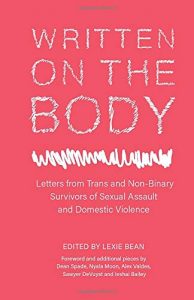 Written on the Body: Letters from Trans and Non-Binary Survivors of Sexual Assault and Domestic Violence edited by Lexie Bean
Written on the Body: Letters from Trans and Non-Binary Survivors of Sexual Assault and Domestic Violence edited by Lexie Bean
“Written by and for trans and non-binary survivors of domestic violence and sexual assault, Written on the Body offers support, guidance and hope for those who struggle to find safety at home, in the body, and other unwelcoming places.”
Survivor Workbooks
Workbooks and other tools for healing from sexual violence.
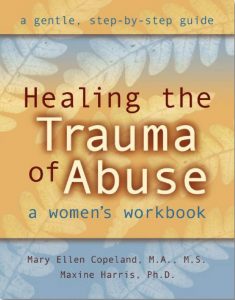 Healing the Trauma of Abuse: A Women’s Workbook by Mary Ellen Copeland, MS and Maxine Harris, PhD
Healing the Trauma of Abuse: A Women’s Workbook by Mary Ellen Copeland, MS and Maxine Harris, PhD
“This book offers proven-effective, step-by-step exercises you can use to work through and minimize the consequences of a traumatic event.”
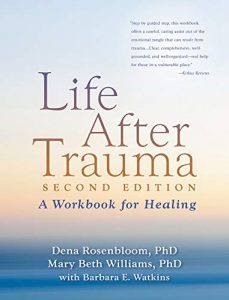 Life After Trauma, Second Edition: A Workbook for Healing by Dena Rosenbloom, Mary Beth Williams, and Barbara E. Watkins
Life After Trauma, Second Edition: A Workbook for Healing by Dena Rosenbloom, Mary Beth Williams, and Barbara E. Watkins
“This compassionate workbook has already helped tens of thousands of trauma survivors start rebuilding their lives. Full of practical strategies for coping and self-care, the book guides you toward reclaiming a solid sense of safety, self-worth, trust, and control, as well as the capacity to be close to others. The focus is on finding the way forward in your life today, no matter what has happened in the past.”
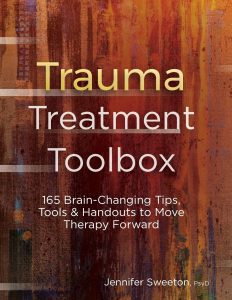 Trauma Treatment Toolbox: 165 Brain-Changing Tips, Tools & Handouts to Move Therapy Forward by Jennifer Sweeton, PsyD
Trauma Treatment Toolbox: 165 Brain-Changing Tips, Tools & Handouts to Move Therapy Forward by Jennifer Sweeton, PsyD
“Trauma Treatment Toolbox teaches clinicians how to take that brain-based approach to trauma therapy, showing how to effectively heal clients’ brain with straightforward, easy-to-implement treatment techniques. Each tool includes a short list of post trauma symptoms, relevant research, application, and clinician tips on how to complete the exercise.”
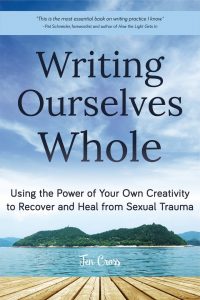 Writing Ourselves Whole: Using the Power of Your Own Creativity to Recover and Heal from Sexual Trauma by Jen Cross
Writing Ourselves Whole: Using the Power of Your Own Creativity to Recover and Heal from Sexual Trauma by Jen Cross
“Writing Ourselves Whole is a collection of essays and creative writing encouragements for sexual trauma survivors who want to risk writing a different story. Each short chapter offers encouragement, experience, and exercises.”
Books About Sexual Violence
Books on topics related to sexual violence.
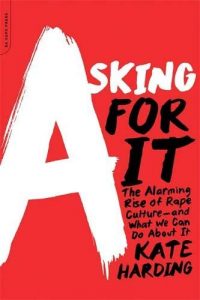 Asking For It: The Alarming Rise of Rape Culture and What We Can Do About It by Kate Harding
Asking For It: The Alarming Rise of Rape Culture and What We Can Do About It by Kate Harding
“In Asking for It, Kate Harding combines in-depth research with a frank, no-holds-barred voice to make the case that twenty-first-century America supports rapists more effectively than it supports victims. From institutional failures in higher education to real-world examples of rape culture, Harding offers ideas and suggestions for how we, as a society, can take sexual violence much more seriously without compromising the rights of the accused.”
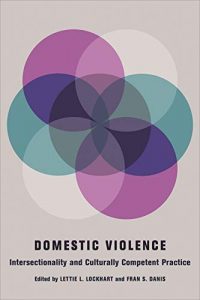 Domestic Violence: Intersectionality and Culturally Competent Practice edited by Lettie Lockhart, PhD and Jan Danis, PhD
Domestic Violence: Intersectionality and Culturally Competent Practice edited by Lettie Lockhart, PhD and Jan Danis, PhD
“In Domestic Violence: Intersectionality and Culturally Competent Practice, experts working with twelve unique groups of domestic abuse survivors provide the latest research on their populations and use a case study approach to demonstrate culturally sensitive intervention strategies. Chapters focus on African Americans, Native Americans, Latinas, Asian and Pacific Island communities, persons with disabilities, immigrants and refugees, women in later life, LGBT survivors, and military families. They address domestic violence in rural environments and among teens, as well as the role of religion in shaping attitudes and behavior. Featuring resources applicable to both practitioners and clients, Domestic Violence forms an effective tool for analysis and action.”
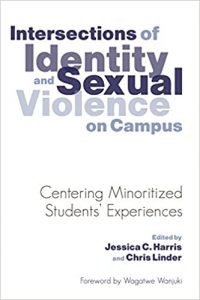 Intersections of Identity and Sexual Violence on Campus: Centering Minoritized Students’ Experiences edited by Jessica C. Harris and Chris Linder
Intersections of Identity and Sexual Violence on Campus: Centering Minoritized Students’ Experiences edited by Jessica C. Harris and Chris Linder
“While sexual violence has been present and prevalent on campus for decades, the work of recent college student activists has made it an issue of major societal and institutional concern. This book makes an important contribution to and provides a foundation for better contextualizing and understanding sexual violence. Each chapter in this edited volume focuses on populations that are not often centered in the discourse of campus sexual violence and accounts for individuals’ intersecting identities and how they interlock with larger systems of domination.”
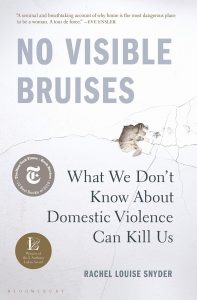 No Visible Bruises: What We Don’t Know About Domestic Violence Can Kill Us by Rachel Louise Snyder
No Visible Bruises: What We Don’t Know About Domestic Violence Can Kill Us by Rachel Louise Snyder
“In No Visible Bruises, journalist Rachel Louise Snyder gives context for what we don’t know we’re seeing. She frames this urgent and immersive account of the scale of domestic violence in our country around key stories that explode the common myths―that if things were bad enough, victims would just leave; that a violent person cannot become nonviolent; that shelter is an adequate response; and most insidiously that violence inside the home is a private matter, sealed from the public sphere and disconnected from other forms of violence. Through the stories of victims, perpetrators, law enforcement, and reform movements from across the country, Snyder explores the real roots of private violence, its far-reaching consequences for society, and what it will take to truly address it.”
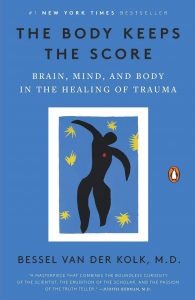 The Body Keeps the Score: Brain, Mind, and Body in the Healing of Trauma by Bessel van der Kolk, MD
The Body Keeps the Score: Brain, Mind, and Body in the Healing of Trauma by Bessel van der Kolk, MD
“In The Body Keeps the Score, Dr. Bessel van der Kolk uses recent scientific advances to show how trauma literally reshapes both body and brain, compromising sufferers’ capacities for pleasure, engagement, self-control, and trust. He explores innovative treatments—from neurofeedback and meditation to sports, drama, and yoga—that offer new paths to recovery by activating the brain’s natural neuroplasticity. Based on Dr. van der Kolk’s own research and that of other leading specialists, The Body Keeps the Score exposes the tremendous power of our relationships both to hurt and to heal—and offers new hope for reclaiming lives.”
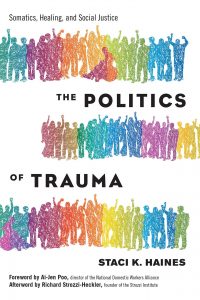 The Politics of Trauma: Somatics, Healing, and Social Justice by Staci Haines
The Politics of Trauma: Somatics, Healing, and Social Justice by Staci Haines
“Just as health practitioners need to consider the societal factors underlying trauma, so too must activists understand the physical and mental impacts of trauma on their own lives and the lives of the communities with whom they organize.” The Politics of Trauma “invites readers to look beyond individual experiences of body and mind to examine the social, political, and economic roots of trauma–including racism, environmental degradation, sexism, and poverty. Haines helps readers identify, understand, and address these sources of trauma to help us bridge individual healing with social transformation.”